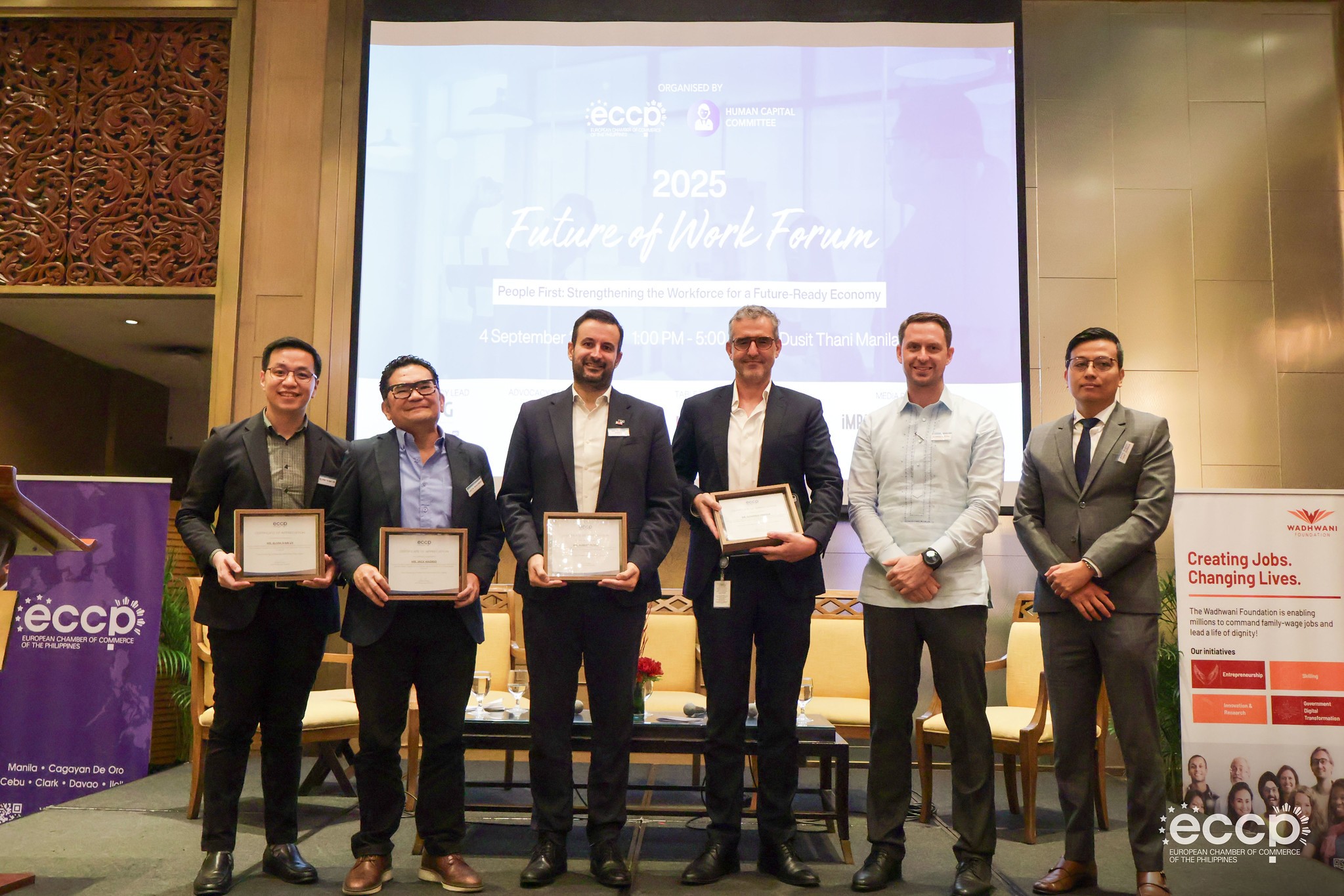
Manila, Philippines – September 5,2025 – In response to the growing urgency of preparing the workforce for a rapidly evolving global landscape, the European Chamber of Commerce of the Philippines (ECCP), through its Human Capital Committee, successfully held the 2025 Future of Work Forum under the theme “People First: Strengthening the Workforce for a Future-Ready Economy.”
The high-level forum brought together government officials, industry leaders, human capital experts, and education stakeholders to explore the dynamic relationship between human capital development and national progress. With industries undergoing unprecedented technological transformation and globalization, the event underscored the strategic importance of upskilling, talent retention, and inclusive workplace practices in strengthening the Philippine economy.
Held on September 4, 2025 at Dusit Thani Manila, the forum featured three compelling sessions:
This forward-looking session highlighted emerging labor market trends and emphasized the importance of proactive, inclusive, and future-focused policies.
Throughout the day, speakers called for deeper collaboration between government, industry, and academia to address persistent skills mismatches, expand access to lifelong learning, and ensure that the workforce is both inclusive and adaptable in the face of change.
The forum began with Welcome Remarks from ECCP Executive Director Florian Gottein. He shared, “In a technological world that’s rapidly changing, evolving, and with intense global competition, we believe that an economy’s greatest asset is its people. By investing in our workforce, in our human capital - by putting people first - we can build a more competitive, inclusive, and resilient Philippines.”
Department of Labor and Employment Assistant Secretary Lennard Serrano urged the industry to take a more proactive role in workforce development. “Industry must play a greater role, not only as users of skills, but as active partners in shaping, investing in, and sustaining the workforce”, he emphasized.
Echoing this call, Dr. Marco Gemmer, Head of Cooperation at the European Union Delegation to the Philippines highlighted the broader opportunities brought by the FTA. He remarked that “..beyond the expansion of trade and investment, the FTA paves the way for knowledge transfer, technology sharing, and the creation of high-value activities in the country. With its vibrant workforce, European companies see the Philippines not just as a market, but as a place where talent can grow.”
Among the distinguished speakers at the forum was Mr. Jack Madrid, President of the IT and Business Process Association of the Philippines (IBPAP), who highlighted the critical role of the IT-BPM sector in driving future-ready skills. He stated, “The private sector cannot afford to be a bystander. We must invest not only in technology, but also in the talent of the future. It’s not just about the tech, but about the human who will manage the tech.”.
Adding to the discussion, World Bank Lead Economist Gonzalo Varela emphasized that the development of artificial intelligence can take different paths. “AI can be developed in a way that augments the skills of workers or in a way that substitutes them. There is no determinism,” he explained. He stressed that AI should not be framed solely as a threat to jobs, as it also has the potential to enhance worker capabilities. “These technologies often emerge in labor-scarce environments, but ultimately, incentives matter most.”
Dir. David Bungallon, Executive Director at the Technical Education and Skills Development Authority (TESDA), underscored the importance of accessible, industry-aligned TVET programs. He stated, “Skills are the foundation of competitiveness. A workforce that is skilled and adaptable drives productivity, attracts investment, and sustains innovation. The EBET Law provides a mechanism for this direct engagement. Its impact depends on how much employers participate—in curriculum development, in workplace-based training, and in co-investing in modern training facilities.”
Rounding out the discussions, Mr. Karol Mark Yee, Executive Director of the Second Congressional Commission on Education (EDCOM II), pointed out the need for systemic reforms to bridge education and labor market needs. He shared, “Through strategic reforms, we can ensure not just quality, but also relevant education for our graduates. This means that completing SHS, TVET, or college should directly translate into gainful employment while meeting the demands of industry. By doing so, we not only strengthen our workforce’s competitiveness and earnings, but also confront inequities and build resiliency.”
At the conclusion of the event, ECCP Treasurer Albert Perez remarked, “We must never forget the human, in human capital. Today we explored how to future-proof our workforce, not by simply reacting, but being proactive in building a foundation of skills, collaboration and resilience. To close, we should not see the end of this forum as the end of our work. Let us take everything we have learned and use it as a call for action to create responsive and inclusive workforce policies, and to champion a more resilient and future-ready Filipino workforce.” ECCP Human Capital Committee Co-chair, Atty. Jon Zuniga added “It has been said that “a problem well-stated is a problem half-solved”. The session highlighted systemic issues that, hopefully, will be top of mind by stakeholders in coming up with proposals to ensure that the Filipino workforce will keep pace with the swift changes in technology and industry demands.”
The event reaffirmed ECCP’s commitment to advocating for human capital development as a cornerstone of national resilience and competitiveness in an increasingly complex world of work.
The forum is also supported by a strong network of event partners, including International Workplace Group (IWG), Wadhwani Foundation, Healthy Work Place, Lee Hecht Harrison, Skills and Talent Employment Pool Inc., IMPACT, and The Manila Times.
To view the official event photos, visit: https://flic.kr/s/aHBqjCt69M